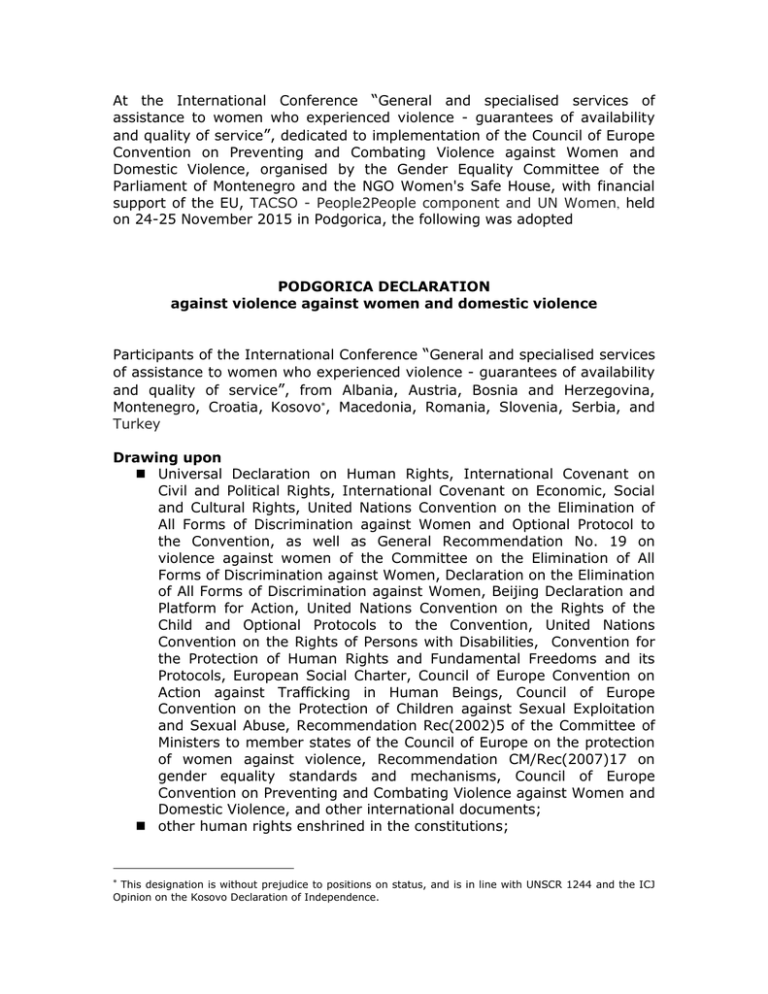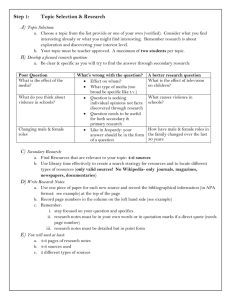Podgorica Declaration
advertisement

At the International Conference “General and specialised services of assistance to women who experienced violence - guarantees of availability and quality of service”, dedicated to implementation of the Council of Europe Convention on Preventing and Combating Violence against Women and Domestic Violence, organised by the Gender Equality Committee of the Parliament of Montenegro and the NGO Women's Safe House, with financial support of the EU, TACSO - People2People component and UN Women, held on 24-25 November 2015 in Podgorica, the following was adopted PODGORICA DECLARATION against violence against women and domestic violence Participants of the International Conference “General and specialised services of assistance to women who experienced violence - guarantees of availability and quality of service”, from Albania, Austria, Bosnia and Herzegovina, Montenegro, Croatia, Kosovo, Macedonia, Romania, Slovenia, Serbia, and Turkey Drawing upon Universal Declaration on Human Rights, International Covenant on Civil and Political Rights, International Covenant on Economic, Social and Cultural Rights, United Nations Convention on the Elimination of All Forms of Discrimination against Women and Optional Protocol to the Convention, as well as General Recommendation No. 19 on violence against women of the Committee on the Elimination of All Forms of Discrimination against Women, Declaration on the Elimination of All Forms of Discrimination against Women, Beijing Declaration and Platform for Action, United Nations Convention on the Rights of the Child and Optional Protocols to the Convention, United Nations Convention on the Rights of Persons with Disabilities, Convention for the Protection of Human Rights and Fundamental Freedoms and its Protocols, European Social Charter, Council of Europe Convention on Action against Trafficking in Human Beings, Council of Europe Convention on the Protection of Children against Sexual Exploitation and Sexual Abuse, Recommendation Rec(2002)5 of the Committee of Ministers to member states of the Council of Europe on the protection of women against violence, Recommendation CM/Rec(2007)17 on gender equality standards and mechanisms, Council of Europe Convention on Preventing and Combating Violence against Women and Domestic Violence, and other international documents; other human rights enshrined in the constitutions; This designation is without prejudice to positions on status, and is in line with UNSCR 1244 and the ICJ Opinion on the Kosovo Declaration of Independence. Remind that: women have the right to equal respect and protection of all human rights and fundamental freedoms in political, economic, social, cultural, civic, and any other area; rights and principles relating to equality, security, freedom, integrity, and dignity of all people are guaranteed by international documents and laws of our countries; Note with concern that the level of violence against women and domestic violence is still high, in various forms and on all levels of society; Point out the need for harmonisation of the legislative and strategic framework with the Council of Europe Convention on Preventing and Combating Violence against Women and Domestic Violence, as well as for higher quality of implementation of laws regulating the issue of preventing and combating violence against women and domestic violence; Request that: presidents of the states, at one of their summits, consider the issue of violence against women and domestic violence, and adopt a document which would strengthen the gender equality policy of preventing and combating violence against women and domestic violence; competent parliamentary bodies include in their work programmes consideration of implementation of the Council of Europe Convention on Preventing and Combating Violence against Women and Domestic Violence and initiate amendments to laws for the purpose of their complete harmonisation with the Convention; the governments: 1. support all relevant institutions dealing with violence against women and domestic violence (police, health and social institutions, educational institutions) in using all institutional mechanisms for combating violence (complete and efficient implementation of laws, drafting and implementing of mediumterm and long-term action plans on activities regarding combating violence and protection of victims, etc.) and empowerment of victims of violence for their better integration into society; 2. recognise contribution, to stimulate and support the work of organisations of civil society, especially women’s NGOs specialised in providing support to women and children who experienced violence; 3. allocate adequate financial means and human resources for adequate implementation of integrated policies, measures and programmes for prevention of all forms of violence against women and domestic violence, including those which are being implemented by the NGOs; 4. promote research, data collection, unification, and publishing of statistical data on cases of violence against women and domestic violence, and association international level; of institutions on the state and Call for institutions for protection of human rights and freedoms, as well as bodies for equality and promotion of equality, to provide, within its competencies, a special contribution to prevention of violence against women and domestic violence, to deterrence of perpetrators by insisting on adequate penal policy and especially to protection of victims as a particularly risky group; Expect that, through legal and institutional mechanisms women and victims of violence should be provided with information on their rights; women, who are exposed to violence, should be provided with access to justice, through the right to fair trial (free legal aid, equality before court, fair conditions of participation in the proceedings, prevention of abuse of rights in the proceedings, efficient implementation of protection measures, adequate compensation of damages caused by violence, etc.); Consider that it is necessary to, regularly and at all levels, ensure raising of the overall public awareness on all forms of violence against women and its effects on children, as well as on the need for its prevention; that the media should report professionally, without sensationalism, on the cases of violence against women and domestic violence; to promote establishment of higher education programmes and research centres at the level of universities to deal with issues of gender equality, with special focus on violence against women; Are concerned with the processes happening at the global level, resulting in a large number of migrants and refugees, including women and children who are particularly threatened by the danger from all forms of violence, and we call for activities aimed at establishing a lasting peace; Advocate for continuation of cooperation of states in the region on implementation and monitoring of the implementation of the Council of Europe Convention on Preventing and Combating Violence against Women and Domestic Violence with the joint goal of achieving zero tolerance for violence against women and domestic violence, development of democracy, and equal participation of both genders in these activities. Podgorica, 25 November 2015

